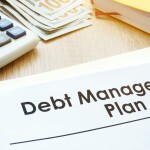Understanding Your Debt
To effectively manage your debt, it is crucial to have a clear understanding of your financial obligations. Begin by creating a comprehensive list of all your debts, including the type of debt, outstanding balance, interest rates, and minimum monthly payments. This assessment will help you gain insights into your overall financial situation and develop a strategic plan for debt repayment.
Creating a Budget
Developing a budget is a fundamental step in managing debt. It allows you to track your income and expenses, identify areas where you can cut back, and allocate funds towards debt repayment. By setting realistic goals and sticking to a budget, you can make consistent progress in reducing your debt over time.
Prioritizing Debt Repayment
Not all debts are created equal. Some may have higher interest rates or stricter repayment terms. By prioritizing your debts, you can focus your efforts on paying off the most expensive or urgent ones first. Consider employing either the debt avalanche method (paying off high-interest debts first) or the debt snowball method (paying off small debts first for a psychological boost).
Exploring Debt Consolidation Options
Debt consolidation involves combining multiple debts into a single loan or credit line with favorable terms. This approach simplifies debt repayment by reducing the number of payments and potentially lowering interest rates. Explore options such as personal loans, balance transfer credit cards, or home equity loans to consolidate your debts and streamline your repayment process.
Negotiating with Creditors
If you are struggling to meet your debt obligations, it's worth reaching out to your creditors to discuss potential solutions. They may be willing to negotiate lower interest rates, reduce minimum payments temporarily, or offer alternative repayment plans. Open communication and transparency about your financial situation can lead to mutually beneficial arrangements.
Utilizing Balance Transfers
Balance transfer credit cards can be a useful tool in managing debt. These cards allow you to transfer high-interest balances from existing credit cards to a new card with a lower or zero percent introductory APR. By taking advantage of this promotional period, you can save money on interest and make significant progress in paying off your debt.
Generating Additional Income
Increasing your income can accelerate your debt repayment journey. Consider exploring opportunities to generate additional income, such as taking on a part-time job, freelancing, or starting a side business. The extra funds can be dedicated to paying off debts more quickly and reducing the overall interest you'll pay.
Cutting Expenses
Reducing your expenses is an essential component of effective debt management. Analyze your spending habits and identify areas where you can make cuts. This may involve eating out less, canceling unnecessary subscriptions, or finding cost-effective alternatives for your everyday expenses. Every saved dollar can be directed towards debt repayment.
Seeking Professional Assistance
If you find it challenging to manage your debts independently, consider seeking professional help. Credit counseling agencies and debt management companies can provide expert guidance and create personalized repayment plans tailored to your situation. They can negotiate with creditors on your behalf and provide valuable financial education to help you regain control of your finances.
Maintaining a Debt-Free Lifestyle
Once you have successfully paid off your debts, it's crucial to maintain a debt-free lifestyle. Avoid falling back into old spending habits and continue practicing responsible financial management. Build a solid foundation for your future by establishing healthy saving and spending habits that support your long-term financial goals.
Building an Emergency Fund
Creating an emergency fund is an essential step in avoiding future debt. Set aside a portion of your income regularly to build a reserve that can cover unexpected expenses or income disruptions. An emergency fund provides a financial safety net and prevents you from relying on credit cards or loans during challenging times.
Investing for the Future
While focusing on debt repayment, it's also important to consider long-term financial planning. Once you have paid off your debts, allocate a portion of your income towards investments that will help you build wealth over time. Consult with a financial advisor to explore suitable investment options based on your goals and risk tolerance.
Staying Motivated Throughout the Journey
Paying off debt can be a challenging and sometimes lengthy process. It's essential to stay motivated and celebrate small victories along the way. Set milestones and reward yourself for reaching them. Find a support system or join online communities where you can share your progress, seek advice, and stay inspired.
Celebrating Milestones
As you make progress towards becoming debt-free, take the time to celebrate milestones. Whether it's paying off a credit card, reaching a specific debt balance, or achieving a predetermined goal, acknowledge your accomplishments. Celebrating milestones helps maintain your motivation and reinforces positive financial habits.
Conclusion
Managing debt requires discipline, determination, and a strategic approach. By following the tips outlined in this article, you can take control of your financial situation and work towards becoming debt-free. Remember, the journey may have its ups and downs, but with perseverance and smart financial choices, you can overcome your debts and achieve long-term financial freedom.
Frequently Asked Questions (FAQs)
- Q: How long does it take to pay off debt? A: The time required to pay off debt varies depending on factors such as the amount of debt, interest rates, and the repayment strategy employed. It can range from several months to several years.
- Q: Will paying off debts improve my credit score? A: Yes, paying off debts can have a positive impact on your credit score. It demonstrates responsible financial behavior and reduces your overall debt-to-income ratio.
- Q: Should I focus on saving or paying off debt first? A: It's generally advisable to establish an emergency fund while simultaneously paying off debt. Having savings to cover unexpected expenses helps prevent further debt accumulation.
- Q: Can I negotiate with creditors on my own? A: Yes, you can negotiate with creditors on your own. It's important to communicate openly, explain your situation, and propose realistic repayment plans.
- Q: Are debt consolidation loans a good option for me? A: Debt consolidation loans can be beneficial if they offer lower interest rates and manageable repayment terms. Consider your specific circumstances and consult with a financial professional before proceeding.








